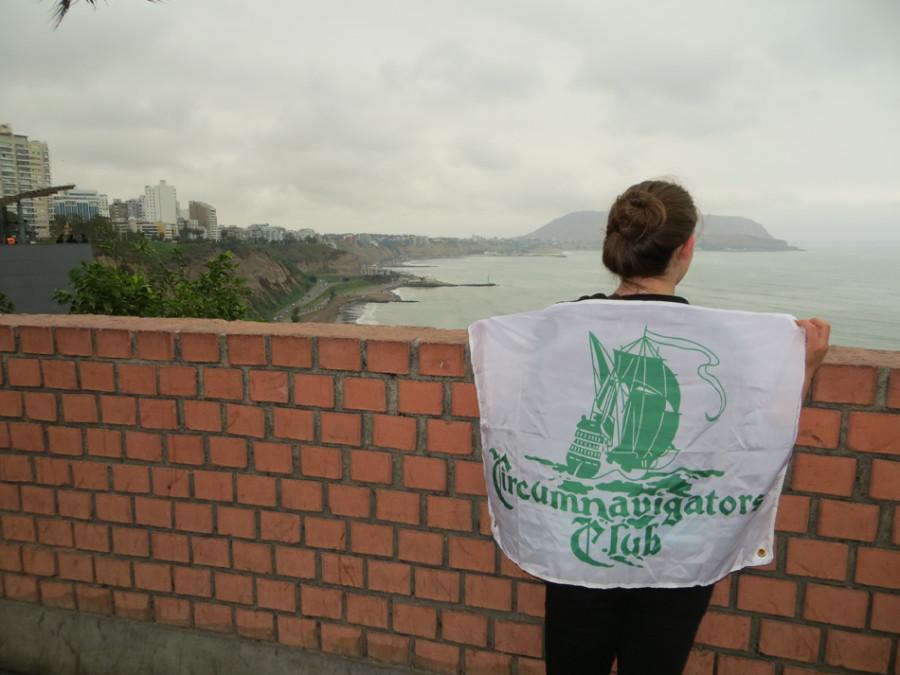Student examines childhood malnutrition around the world
Weinberg junior Elizabeth Larsen poses with the Circumnavigators Club flag while on her global trip this summer. After receiving the Club’s $9,000 annual grant, Larsen traveled to seven countries and five continents.
February 4, 2015
A&E
Seven countries, five continents and one summer.
Weinberg senior Elizabeth Larsen’s travel experience was made possible when she won the 2014 Circumnavigators Travel-Study Grant.
On Tuesday night, Larsen spoke in front of about 30 people about her global travels during which she researched solutions to the problem of childhood malnutrition.
The 2014 Circumnavigators Travel-Study Grant funded Larsen’s trip. Each year, the $9,000 grant, sponsored by the Chicago chapter of the Circumnavigators Club, is awarded to a junior who is interested in traveling the world and researching a specific topic.
“It is a 113-year-old club of people who have traveled all the way around the world,” Circumnavigator Club member Dan Peterson said. “(The award goes to an) outstanding student who has brought forth an impressive research idea.”
Larsen, an economics and global health major, observed childhood malnutrition clinics in Guatemala, Peru, Austria, Uganda, Rwanda, Nepal and Cambodia during her travels.
“What really inspired the project was that I just had been working at a nonprofit clinic in Guatemala,” Larsen told The Daily. “I had been working on this clinic, and I wanted to find something to help solve childhood malnutrition.”
In her speech, Larsen talked about the huge problem of childhood malnutrition, which is concentrated in the most impoverished areas of the world. Malnutrition causes stunted or underdeveloped growth in children.
“This malnutrition early in a child’s life has profound consequences on their physical growth and development,” Larsen said. “These kids may tend to struggle in school because their brains don’t have the nutrients to fully develop. These kids are predisposed to higher rates of obesity because their metabolism didn’t develop fully in their infancy.”
Larsen embarked on the trip alone, traveling to each of the seven countries over the summer of 2014. In each country, she visited childhood malnutrition clinics and studied what worked in solving the problem and what didn’t. In the end, she concluded three main points related to childhood malnutrition she hopes to use in her work in the future.
First, she discovered that agricultural solutions, programs that taught farmers how to effectively grow a nutritious diet, tend to be most cost effective and productive. She also concluded that younger children showed better nutritional outcomes.
“Not all of these organizations focused on children under the age of two, some focused on kids under the age of five and some (focused on) school-aged kids,” Larsen said. “And while it is possible to nutritionally recuperate kids of that age, it is much easier if you get kids in infancy or, better yet, pregnant mothers pregnant with their first child.”
Lastly, she discovered that programs that utilized a group dynamic were the most successful in curbing childhood malnutrition. By visiting each country back to back, it was easy for Larsen to compare and contrast the different clinics’ techniques. She hopes to utilize what she learned over the summer by connecting some of the organizations she visited.
“I think one of the biggest things that I learned is that things are more the same across the world than they are different,” Larsen told The Daily. “The general problems across the world, especially regarding nutrition, are the same. The solutions will need to be tailored, but what will work in one place will generally work in others.”
While Larsen traveled, she not only observed the malnutrition clinics, but also experienced the culture of each place. In Peru she climbed Machu Picchu, and in Rwanda she visited the Kigali Genocide Memorial. Her favorite experience was when she attended the second day of the Teej festival in Nepal.
“It’s a multi-day festival dedicated to Lord Shiva,” Larsen said. “I went with my host mom, and we went shopping for a red sari. I was probably the only foreigner in streams of thousands and thousands of women.”
After Larsen’s speech, she had a question-and-answer session about her trip. Ultimately, Larsen found not only several answers to her questions about childhood malnutrition on her trip, but also a sense of community with the rest of the world.
“I was alone, but I stayed with a global family I never expected to have,” Larsen said. “People are generally nice and kind and ready to help.”
Email: [email protected]
Twitter: @amandasvachula


